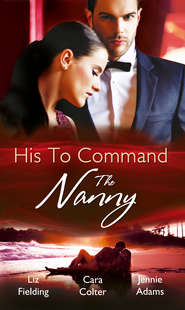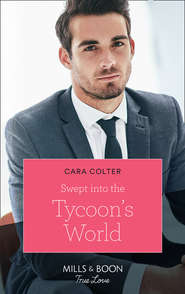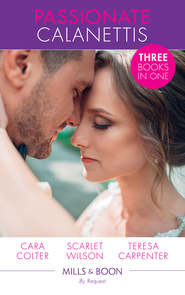По всем вопросам обращайтесь на: info@litportal.ru
(©) 2003-2024.
✖
A Hasty Wedding
Автор
Год написания книги
2018
Настройки чтения
Размер шрифта
Высота строк
Поля
She looked every inch the old spinster secretary who had made herself indispensable, but was about as alluring as that stout old grandfather clock in the corner. Not that she was stout. She knew she had a lovely figure—that she had gone to great and very professional lengths not to draw attention to.
Today she was wearing a below-the-knee navy skirt and matching jacket, a white silk blouse done up primly to the very place on her throat where the knife had rested only moments ago. Her pumps were sensible and added no height to her five-foot-seven frame. Her hair was light brown, virginally untouched by dyes or highlights, and kept in a no-nonsense bun. Her glasses, which she did not really need, covered her face, brow to cheekbone, and did nothing at all to show off the delicate shades of eyes so truly hazel that they appeared blue when she wore blue, brown when she wore brown, and green when she wore green.
The portrait she presented was the one she had worked to present: the world’s most efficient secretary.
Growing up in the shadow of her socialite mother, who had made glamour her goddess, Holly had rejected using appearances to gain power. She wanted to be respected for what she was, not for how she looked.
What she was was hardworking, honest, reliable, well-grounded, competent and mature beyond her years.
Not at all the kind of person love happened to.
If she was honest—and now that she had her moment of clarity, there was no going back to lying to herself—it had happened the first time she had seen Blake.
The look in his eyes, the set of his shoulders, the tilt of his chin, the smile that had lit his face when little Dorothy Andrews had brought him a rock she had painstakingly painted. It had happened right then.
Determined not to be ruled by her newfound realization, nor to be terrified by it, Holly turned from the mirror, added a few logs to the fire that was sputtering and marched back to her chair.
She looked at her agenda, flicked open the computer file for transfer documents, and typed in the first name on her list.
Her heart felt like it was going to explode inside her chest, and her face felt like it was on fire.
She squinted at what she had typed.
Dismayed, she read the very thought that had come to her with such startling clarity when a knife held at her throat had made her face her deepest secret and her strongest yearning, her soul telling her what would make her life complete.
Instead of the name Clifford Drier, she had typed, I am in love with my boss.
She stared at it. She highlighted it to erase with her delete button, and instead managed to put it in bold print.
I am in love with my boss.
Ridiculous, that she, a paragon of responsible secretarial behavior, would write such a thing, nurse such a childish and unprofessional crush. Ridiculous that she would believe she had loved him from their first meeting. As if love could happen that fast!
Everybody loved him. The kids loved him. The staff loved him. The benefactors, especially Joe Colton and his beautiful wife, Meredith, loved him. She’d have to get in line to love Blake Fallon!
She went to insert a bold not in between “am” and “in.”
The line magically deleted, as if it had never been.
Two
B lake climbed in his ranch vehicle, a brand-new silver-gray Nissan Pathfinder that had been donated to the ranch recently by Springer Petroleum. A surprising donation, authorized by Todd Lamb, who had replaced David Corbett as vice president of Springer after Corbett had been arrested for poisoning the water.
A premature arrest as it turned out, to the surprise of no one who knew Corbett. Blake, whose skills at judging people had been honed to razor fineness because of a childhood that required a number of interesting survival skills, including the ability to read people quickly and accurately, had suspected they had the wrong man.
But he had been wrong many times, too, most notably when Joe Colton had come to his rescue, after a judge had decided that was one motorcycle too many that Blake had helped himself to. An angry young teen at the time, Blake had nearly been bitter enough to not listen to the voice deep within him that had told him, loud and clear, this man you can trust.
Joe just had never given up on him. Ever.
Since then, Blake had learned to listen a little better to that voice that whispered within him. It helped, especially, in dealing with these kids. Kids who had learned to lie and cheat and steal when most kids were learning their alphabet. Blake could tell in a glance if a child was lying—and why. There were so many motivations, and few of them had anything to do with the kid being bad. Self-preservation and fear were the two that usually headed the list.
He could also tell if it was a tortured, unexpressed sadness that had motivated an act of vandalism, or a need for attention, or just plain old garden-variety belligerence.
So, when he’d first heard David Corbett had been arrested, he’d told his pal Rafe James his thoughts on the subject. Short and sweet. No way it was Corbett.
Rafe came from the mean streets, too. He read people as well as Blake did, maybe better. The happy ending to David’s tragic false accusation was that Rafe was a changed man—the quintessential lone wolf’s heart had been warmed by David’s fiery daughter, Libby.
The thing that struck Blake as odd about Todd Lamb having Springer donate the vehicle to the ranch was that it was the type of thing David Corbett might have instigated, but not Todd. David, on the few social occasions when they had met, had always impressed Blake as being open, generous, authentically kind. It had been such a relief when David’s name had been cleared and he’d been let out of jail. Always a man determined to find reason in all the events of his life, David said the whole incident had propelled him toward doing what he really wanted to do with his life. He’d retired. Still, if the culprit was not David it did mean that a very dangerous individual, one capable of harming children, one who had tossed the dice with human lives, was still on the loose out there.
Todd Lamb, on the other hand, whom Blake had also met at the odd ranch fund-raiser or at Colton social functions, seemed to be cold, ruthless and ambitious. Not the kind of man who would give away a vehicle without a string attached.
The vehicle had come with the official explanation that Springer knew what an incredible inconvenience the residents and staff had been put to because of the ranch being evacuated. The official letter said that though they claimed no responsibility even though the chemical found in the water, DMBE, was used by them, as a responsible corporate citizen they hoped to be of assistance by offering extra and reliable transportation while kids were still being ferried around the countryside as a result of the contaminated water.
Blake’s first conclusion had been that Holly must have gone to Todd, her father, and asked him to help out. She’d had to put a lot of miles on the old ranch vehicle, a minivan that had probably been the prototype for minivans, but when he’d asked her, Holly had looked as surprised as he by her father’s generosity.
It seemed incongruous that she could have sprung from the same tree as Todd Lamb. Though Blake detected a slight physical resemblance between the father and daughter, that seemed to be where all similarity ended. Holly had qualities of warmth and gentleness and integrity that shone right through those convent-approved suits she wore.
In just eight months, Blake was amazed how absolutely indispensable she had become to him. How her presence had changed the whole office.
Her predecessor, Mrs. Bartholomew, had been a battleship in pink polyester. Efficient, yes. Pleasant, no. The kids had been terrified of her. She called it respect. He might have been a little terrified of her himself, though he’d done his best never to let it show—another trick of an old street fighter.
Certainly the whole ranch staff seemed to have sighed a big sigh of relief when she had announced her retirement.
And then Holly had come. His office was in a lovely old white clapboard ranch house that had been converted. He had a simple apartment upstairs, which the downstairs served as office space for the Hopechest Ranch.
Holly had loved the house on sight.
“Oh,” she’d said dreamily, of the outer office, “this used to be the front parlor of this house.”
He’d seen a certain gleam in her eye when she investigated the old river rock fireplace that seemed so out of place among filing cabinets and her desk, and the government office reject chairs lined up against the walls for kids who were in the office having paperwork done or were waiting to see him.
Soon she had a fire crackling away in that hearth every single day. The kids loved it, and the older ones lined up for the opportunity to chop and haul wood for her.
Then her desk had been pushed back into a corner, and the ugly metal frame green and orange vinyl chairs had disappeared. From somewhere she’d found an old blue sofa that she’d put a bright plaid throw over, and several wingback chairs which she had grouped around the fireplace.
An old trunk served as a coffee table, and it always had a heap of comic books, coloring books and crayons on it. She had hung lace valances on the tall old windows, and their wide casings held an assortment of plants that the children clamored to water.
A huge round fishbowl with four residents of various colors and fin shapes had a place on top of her filing cabinet. Standing on a chair to sprinkle feed for the fish seemed to be a special honor reserved for newcomers who arrived confused, frightened and tearstained.
Often the quiet murmur of voices drew him out of his office and he would find her, work stopped, having a quick snuggle on the couch with a needy child.
With something approaching reverence she took the artwork the children had made, and while they watched, she would pop it into a cheap frame and hang it on a bare spot on the wall. One whole wall, floor to ceiling, was nearly completely covered with these bright testaments to the resiliency of the human spirit.
The only pictures that had hung on the walls before were the worker’s compensation posters that Mrs. Bartholomew had put up religiously. As if she was in any danger of falling off a ladder, or being backed over by a truck. Pretty hard to miss something that big in that shade of pink. But if someone had hit her with a truck, he had the uncharitable thought it was the truck that would have needed repairing, not Mrs. B., as she had reluctantly permitted herself to be called.
“What are you going to do when you run out of walls?” he’d teased Holly one day.
“Run out of walls?” she’d said, astounded. “We have a whole ranch.”











